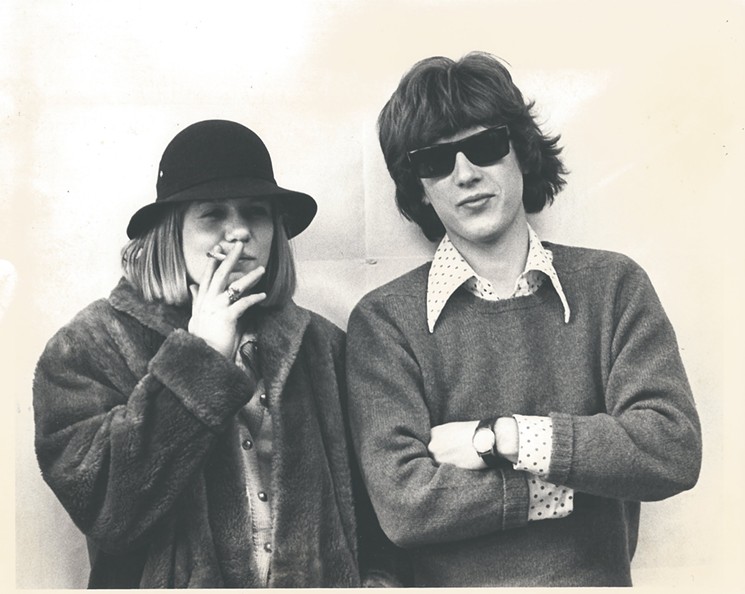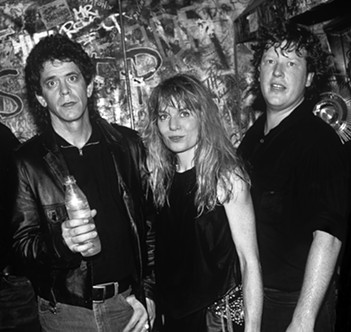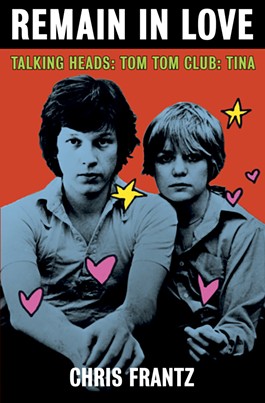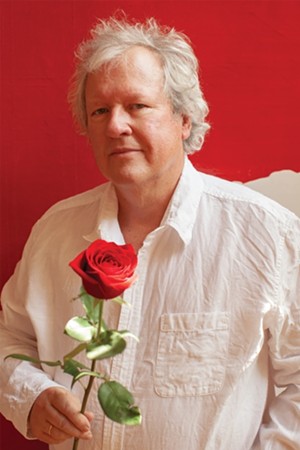“Suddenly, as in a scene from a Truffault movie, I saw a girl pedaling down Benefit Street in our direction on an old yellow three-speed bicycle,” he writes in his upcoming memoir, Remain in Love: Talking Heads * Tom Tom Club * Tina (400 pp., $29.99, St. Martin’s Press). “She wore a blue-and-white-striped French sailor’s shirt and very short shorts. She was a slender, fit, and her legs were fabulous. As she pedaled by, her blonde shag haircut tossed in the breeze.”
After Frantz pondered aloud as to the woman’s identity, his friend piped up that he knew her and mentioned her name. Frantz was entranced, even though he had a girlfriend at the time and soon found out Weymouth had a boyfriend. “Even though this was the first time I’d seen her, I felt some kind of familiarity or even kinship. I had to meet Martina.”
On the phone nearly 50 years later, it’s easy to hear how Frantz exemplifies his book’s title. “She was a very good looking young woman, but as I got to know her, found out she was also really smart and perceptive with a fine sense of aesthetics in music, art, and literature. Tina just knew a lot!” Frantz says. “And music! She could read it, whereas David Byrne and I couldn’t! And the more I got to know her, the more I liked her. A strong feeling of love that remains to this day.”
On a back cover blurb, a lovelorn Bill Murray – who had a crush on Weymouth after seeing an early Talking Heads gig — says with dry understatement “it’s become pretty clear to me that she’s already in a relationship, and what’s more, it looks to be serious.”
In Remain in Love, Frantz details their musical and matrimonial partnership – which included stints for both of them in a couple of well-known acts from the mid-‘70s to early ‘90s. The genesis of Talking Heads began when he (on drums) and a former RISD student David Byrne (vocals/guitar) began playing music together. They added Weymouth on bass – even though she had never played the instrument – and began gigging at area clubs like New York’s CBGB’s.
It was clear that these preppy-looking art students were miles away in look and sound from other groups that played the club like Television, the Ramones, Richard Hell and the Voidoids, and Blondie. But then again, while they were all lumped together as “punk” they were all wildly different from one another.
The band added guitarist/keyboardist Jerry Harrison just before recording debut album Talking Heads in 1977. And until they officially broke up in 1991, put out a series of challenging and groundbreaking records, a concert film, and memorable singles like “Psycho Killer,” a cover of Al Green’s “Take Me to the River,” “Life During Wartime,” “Once in a Lifetime,” “Girlfriend is Better,” “Road to Nowhere,” “And She Was,” and “Wild Wild Life.”
The book was originally scheduled to come out in May, but due to the pandemic now has a July 21 publication date. Frantz, Weymouth, one of their two sons, Frantz's brother, and three dogs are holed up in their country house in Connecticut. “We’re very fortunate in that we can go out and roam around. We’re not stuck in a tiny New York apartment,” he says. But even before he put pen to paper, he had to ask himself an important question.
“I thought ‘What is the tone of this book going to be?’ And the last thing I wanted was a book by a whiny drummer beating up on a lead singer,” he says. “That’s not me. I’m grateful and have wonderful memories of my times with Talking Heads.”
While David Byrne is likely the only member of Talking Heads (and yes, there’s no “The” in front of the band’s moniker), that the general public could name, an unfortunate myth has grown that the band was his sole creative vision with all credit due to him. Frantz is firm that this was not the case – that Talking Heads were much more collaborative – and Byrne is guilty of the “sin of omission” when it came to songwriting credits that usually had his name only.

Tina Weymouth and Chris Frantz as students at the Rhode Island School of Design.
Photo and copyright by Roger Gordy/Courtesy of St. Martin's Press
Frantz also notes many other occasions where the very idea of sharing credit or the spotlight or musical decision making was anathema to Byrne. And that as the band got more successful and popular, it made him even more “cold and dyspeptic.” Asked as to why he, Weymouth, and Harrison didn’t confront Byrne about these issues, Frantz says it was all about balance.
“Well, we did talk to him about it. And David is not wired the same way I am in his brain. It’s a different type of chemistry going on in his head. You can call it being on the spectrum or narcissism, but it’s a real thing,” he says.

Lou Reed (left) joined Tina, Chris, and the Tom Tom Club onstage at CBGB's in the late '80s.
Photo and copyright by Ebet Roberts/Courtesy of St. Martin's Press
Frantz also writes about the many occasions that Byrne and others in the band’s orbit would marginalize Weymouth and her playing and contributions due to outright sexism, making things extra sensitive for the man who served a dual role as bandmate and boyfriend/husband.
“It was very difficult for me. I was very close to Tina, but I was also close to David and Jerry – not in the same way, of course!” Frantz laughs. “And I admired [Talking Heads producer] Brian Eno. I had to take a deep breath and at some point you realize that being in a rock and roll band is not easy. I mean, it’s easier than digging a ditch, but there’s a lot of ups and downs and twists and turns, and you just have to ride them out.”
Remain in Love isn’t skimpy on details about the Talking Heads’ early tours, as names of clubs, opening acts, meals consumed, crowd size, and even what money the band made are mentioned. Frantz says that he consulted Weymouth’s well-kept datebooks for a lot of that information, adding that she is writing her own book which he has not read yet, and that she didn’t see Remain in Love until it was almost completed.
“Both of us felt like we had good stories to tell, but we were also sensitive to the fact that most of what has been written about Talking Heads was either made up and not true or regurgitated information from [the past],” he says.
Frantz and Weymouth also formed the core of the offshoot band the Tom Tom Club, whose music showcased far heavier influences in dance, rap, and R&B. In 1981, they scored a massive radio and club hit with the utterly unique “Genius of Love,” sung by Weymouth and her sisters. An animated video was in constant rotation on MTV, and likely the first time a lot of its audience even heard the name “James Brown.”
Frantz says he knew it had become something big one afternoon in New York as he was walking around Sixth Avenue and Houston Street (“I know you’re in HU-ston, but there it’s pronounced HOW-ston!” Frantz laughs).
He passed by an area of bustling basketball courts populated mostly black and Latino players. Local R&B radio station WBLS was playing an extended mix of the song, and every boom box on the courts seemed to be tuned into the station.
“All these guys, like 50 of them, stopped playing basketball and just started dancing to ‘Genius of Love!’ I sat on a bench and just watched. And I thought ‘Well, this is it. We’ve made it and crossed over into a whole different realm from Talking Heads!’”
Talking Heads were inducted into the Rock and Roll Hall of Fame in 2002. And unlike other groups which had a history of conflict among themselves (Creedence Clearwater Revival, Blondie, KISS), the four members reunited for a one-off set of three songs. It remains the last time the quartet were together.
“It was intense, but in a good way. And nerve-wracking since we hadn’t played together in many years,” Frantz offers. “We rehearsed four songs for three days. It felt really good. It was bittersweet but mostly sweet. What was great is that our kids got a little taste of what their parents’ band was like. I know Jerry [Harrison] felt the same way.”
As for the future, Frantz says he is working on another book while Weymouth finishes hers. Then they might record a low-key EP of electronic/synthesizer music as a duo.
“Something like Kraftwerk. Talk about a band that absolutely should be in the Rock and Roll Hall of Fame!” Frantz says. “I think I voted for the five times on the last ballot!” And eventually, they hope to welcome audience members once more to their Club.
“We’re waiting for the coronavirus to cool down so we can play as the Tom Tom Club again,” he says, before singing off with a well-wish based on local current events. “And good luck to you and the rest of the Houston crowd. I see the news is bad down there!”




